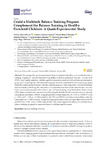Could a Multitask Balance Training Program Complement the Balance Training in Healthy Preschool Children: A Quasi-Experimental Study

Use este enlace para citar
http://hdl.handle.net/2183/25856Coleccións
- Investigación (FEP) [513]
Metadatos
Mostrar o rexistro completo do ítemTítulo
Could a Multitask Balance Training Program Complement the Balance Training in Healthy Preschool Children: A Quasi-Experimental StudyAutor(es)
Data
2020-06Resumo
[Abstract] This prospective quasi-experimental study investigated the efficacy of a multitask balance training program to improve the balancing ability of healthy preschool children. A total of 85 (51.8% boys) healthy preschool children aged 4–6 years were randomly divided into an intervention group and a control group. The intervention group received a multitask balance training program, while the control group received a placebo training program. Outcomes were collected at baseline and immediately following the intervention. Independent members of the research team recorded balance skill measurements in the cohort at pre- and post-training using the Pediatric Balance Scale (PBS). Balance-related outcomes were recorded using the Battelle Development Inventory in Spanish using the second edition (BDI-II). A significant effect of time interaction (F = 7.27, p = 0.015; F = 6.16, p = 0.02 and F = 7.41, p = 0.014) existed for the PBS and BDI-II over balance immediately after the intervention (p < 0.001 for each). A significant group-by-time interaction was detected for the PBS and BDI-II (p < 0.001 and p = 0.006, respectively). This study supports the efficacy of multitask-based balance training programs to improve balance in children aged 4–6 years.
Palabras chave
Balance
Training
Children
Training
Children
Versión do editor
Dereitos
Atribución 4.0 España
ISSN
2076-3417






